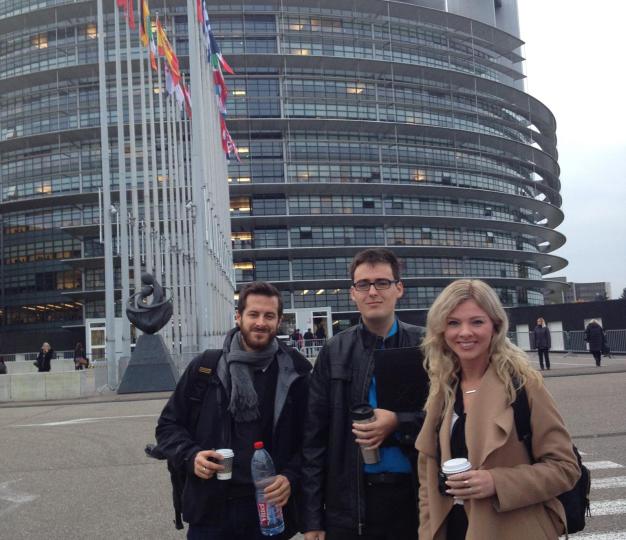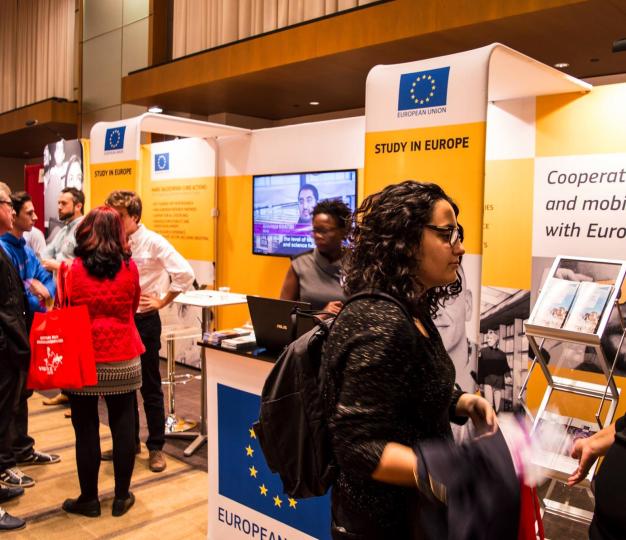Travel & Study
Travel & Study
There are many opportunities for Canadians to get familiar with EU institutions, policies and the decision-making process. Canadians are welcome to study in Europe thanks to programmes such as Erasmus+.
EU Visitors Programme
We invite young Canadian leaders to participate in the European Union Visitors Programme, a five to eight-day, tailor-made visit to Brussels that gives participants an opportunity to gain insights into the institutions and workings of the European Union.
EUVP participants include active or future decision-makers and opinion-makers whose potential influence and/or leadership prospects within their respective professional field are likely to be of long-term importance to the European Union.
The EUVP is jointly supported and administered by the European Parliament and the European Commission.
Visits take place during the year following the successful application. EUVP covers with all travel, hotel and per diem costs.
Generally, applications deadline is 31 March for the visit the following year. Applications received after the deadline will not be considered. A final selection by a Brussels panel and selection results are usually available by the end of the year.
Eligibility:
- Canadian citizenship.
- Ages 30-40.
- Have a relevant political, government, academic, media or civil society background (not open to business people).
- University degree, or equivalent training, with some years of professional experience.
Application Procedure:
Please send the following documents to the EUVP Liaison Officer, Gabriel Gonzalez gabriel.gonzalez@eeas.europa.eu Tel.: +01 (613) 563-6355)
- A completed application form.
- A detailed resume.
- A detailed statement of purpose indicating your interests in the programme, the topics you would like to cover during your visit, and potential meetings you would like to have.
- i.e. model statement of purpose
Due to the COVID-19 pandemic, the EUVP is currently on hold.
EU-Canada Young Journalist Fellowship
Recognising outstanding journalistic talent among young Canadians, three candidates have been selected every year since 2001 to participate in a week-long study tour to experience EU institutions, the Canadian Mission to the EU, and media outlets in Brussels.
All expenses are paid for by the European Union Delegation to Canada.
Prior to the trip, winners are invited to an awards ceremony co-hosted by the Office of the Speaker of the House of Commons and the Canadian Association of Journalists (CAJ) in Ottawa. Winners also benefit from a one-year CAJ membership or renewal.
The Fellowship seeks to reinforce links between Europeans and Canadians and to raise awareness of the EU among a new generation of Canadian students and journalists.
The award is generally launched in early March with submissions due in early May. The study tour takes place in the fall.
Due to the COVID-19 pandemic, the timeline above has changed. Please check details here.
Study
The EU Erasmus+ programme is open to Canadian students, institutions and youth organisations and offers a range of specific opportunities.
Erasmus+ for students and researchers:
- International Credit Mobility: providing short-term study scholarships (3-12 months) in a participating European University counting towards a degree back home. To participate, students must check if their own university (international office) has an international credit mobility agreement with corresponding universities in the EU.
- Erasmus Mundus Joint Master or Doctoral Degrees (EMJMD): offers full scholarships to complete a full master or doctoral degree offered by a consortia of European universities.
- Marie Skłodowska-Curie Research Fellowship Programme: funding provision for up to 3,000 PhD scholarships per year in Europe. There are vacancies all year round and Canadian candidates should apply directly to the projects published on the Erasmus+ website.
Erasmus+ for Higher Education Institutions
Higher Education Institutions may apply for funding to join consortia of European partners to offer:
- Joint Master Degrees (as partners): Developing joint degrees of exceptional quality open to students worldwide.
- Credit Mobility: Universities contact their European partners to prepare programmes for funding that enable the transfer and recognition of credits between both. European universities apply for funding on behalf of the partnership.
- Jean Monnet Activities: Replacing EU Centres of Excellence, Erasmus+ provides funding to support teaching and research of EU studies worldwide. Jean Monnet grants continue to support actions and activities in the fields of education, training and youth. Since 2007, there have been 49 successful projects selected for Jean Monnet funding in Canada. There are annual Calls for Proposal, inviting participation by Canadian universities.
List of universities that have benefited from Jean Monnet funding in Canada:
| University | Activity |
|---|---|
| York University | Jean Monnet Chair |
| Carleton University |
Jean Monnet Chair Jean Monnet Centre of Excellence |
| Université de Montréal |
Jean Monnet Chair Jean Monnet Centre of Excellence |
| Dalhousie University |
Jean Monnet Information Project Jean Monnet Centre of Excellence |
| University of Victoria |
Jean Monnet Information Project Jean Monnet Centre of Excellence |
| University of Toronto | Information and research activities |
| University of Alberta | Module |
| University of Ottawa | "Ad personam" Jean Monnet Chair |
| University of British Columbia | Jean Monnet Chair |
Erasmus+ for Youth Organisations
Erasmus+ provides an opportunity for Canadian organisations and participants to get involved in joint projects with their European counterparts to achieve cooperation for innovation and the exchange of good practices.
Programme actions include:
- Capacity building in the field of youth: enabling transnational non-formal learning (such as youth exchanges and the European Voluntary Service) while being integrated with education systems and the labour market.
- Strategic Partnership projects in the field of youth: partnerships last between 6 and 36 months while addressing a broad range of topics, such as cooperation between regional authorities and encouraging the active participation of young people in society.
Visas
Travelling in Europe is the European Union's official website for people travelling in the 27 countries of the European Union. Whether you are on holiday or business, you will find practical advice and helpful tips on a wealth of subjects, from what documents you need to getting healthcare and using your mobile phone.
There is so much for the traveller to discover and all this has been made much easier thanks to the European Union. You can move freely between most European countries thanks to the Schengen Agreement. What's more, the introduction of the Euro in 19 countries has eliminated the cost and inconvenience of having to exchange currencies.
Citizens from more than 60 countries, including Canada, do not need a visa to visit the EU for a period of up to three months (90 days).
For more information on Schengen Visa policy & EU Visa Policy, click here.
List of Embassies of EU Member States in Canada.



